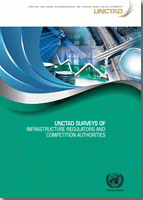
Infrastructure services sectors (ISS) such as transport, telecommunications, energy, water and financial services constitute the backbone of economies. They possess strong forward and backward linkages with the rest of the economy. In addition to their significant contribution to economic growth, ISS also assume an important social function, as access to basic services (including safe drinking water and electricity), financial inclusion and bridging of the digital divide, are catalytic to the achievement of the Millennium Development Goals.
About 300 million people (10 per cent of the world’s work force) are employed in ISS. The global ISS output was estimated at $8.6 trillion in 2010, or some 14 per cent of global output, of which developing countries as a group represent 31 per cent. The value of global ISS exports was $1.4 trillion in 2011, having expanded at an annual average pace of 11 per cent since 2000. This represents 32 per cent of world services exports, or 6 per cent of world exports of goods and services. With the rise of private investment in ISS the value of foreign direct investment flows directed at ISS also saw major growth. The share of ISS in total foreign direct investment inflows increased from 21 per cent in 1990–1992 to 30 per cent in 2008–2010. Along with business services, ISS play a critical role in the expansion and deepening of global value chains, and the expansion of trade associated with them. They also constitute major tasks performed in global value chains, as the line between manufacturing and services is increasingly blurred.
In 2009 UNCTAD’s Trade Negotiations and Commercial Diplomacy Branch conducted a survey as part of its follow-up work on the recommendations of the first session of the Multi-year Expert Meeting on Services, Development and Trade: the Regulatory and Institutional Dimension, held in Geneva 17–19 March 2009. The objective of the survey was to take stock of the regulatory environment in key infrastructure services, with the goal of ascertaining regulatory and institutional best practices, and challenges faced by regulators in developed, developing and least developed countries. After the submission of the first survey to the second session of the expert meeting in March 2010, a follow-up second survey was launched in the following year to ascertain the specific trade-related challenges faced by regulators and the regulatory and institutional practices which can promote development gains associated with trade in ISS. This report aims to present and analyse the findings of the surveys.


